|
|
|
Sort Order |
|
|
|
Items / Page
|
|
|
|
|
|
|
| Srl | Item |
| 1 |
ID:
086999
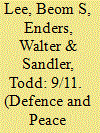

|
|
|
|
|
| Publication |
2009.
|
| Summary/Abstract |
In February 1998, Osama Bin Laden published a signed statement calling for a fatwa against the United States for its having 'declared war against God'. As we now know, the fatwa resulted in the unprecedented attack of 9/11. The issue of whether or not 9/11 was in any way predictable culminated in the public debate between Richard Clarke, former CIA Director George Tenet and the White House. This paper examines whether there was any evidence of a structural change in the terrorism data at or after February 1998 but prior to June 2001, controlling for the possibility of other breaks in earlier periods. In doing so, we use the standard Bai-Perron procedure and our sequential importance sampling (SIS) Markov Chain Monte Carlo (MCMC) method for identifying an unknown number of breaks at unknown dates. We conclude that sophisticated statistical time-series analysis would not have predicted 9/11.
|
|
|
|
|
|
|
|
|
|
|
|
|
|
|
|
| 2 |
ID:
105982
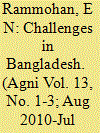

|
|
|
| 3 |
ID:
119771
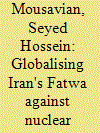

|
|
|
| 4 |
ID:
187257
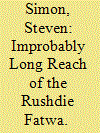

|
|
|
|
|
| Summary/Abstract |
More than 33 years after Ayatollah Ruhollah Khomeini issued the extraordinary fatwa calling for Salman Rushdie’s death for blaspheming Islam in The Satanic Verses, a Lebanese-American man attacked and badly injured Rushdie in upstate New York. Although the attacker may have drawn some inspiration from Iran’s hostility towards Rushdie, and the attack did coincide with the discovery of Iranian plots to assassinate American officials in retaliation for the killing of Qasem Soleimani, there is no evidence that Iran or any Iranian proxy was involved, and there seemed to be no information about active threats. Iran’s response to the attack was malicious and provocative, but its condemnation of blasphemy is hardly unique or surprising. It is unrealistic for some Western commentators and officials to conclude that Iran’s vendetta against Rushdie means it cannot be trusted to abide by a revived Joint Comprehensive Plan of Action.
|
|
|
|
|
|
|
|
|
|
|
|
|
|
|
|
| 5 |
ID:
122772
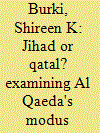

|
|
|
|
|
| Publication |
2013.
|
| Summary/Abstract |
There is widespread acknowledgment that the modus operandi of jihadis affiliated with Al Qaeda and associated movements (AQAM) relies on brutal terror-inducing tactics which, more often than not, target Muslim and non-Muslim non-combatants. This article comparatively analyzes the AQAM modus operandi within the traditional stipulations of Islamic precepts with respect to waging jihad al saghir. The purpose is to glean whether or not such tactics such as suicide bombings, declaring fellow Muslim apostates in order to kill them, use of IEDs and EFPs to target civilians, constitute legitimate rules of engagement in jihad al saghir.
|
|
|
|
|
|
|
|
|
|
|
|
|
|
|
|
| 6 |
ID:
188974
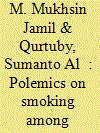

|
|
|
|
|
| Summary/Abstract |
This paper examines various views, ideas, opinions, understandings, and interpretations among Indonesian societies, including Islamic scholars and Muslim social organizations toward tobacco products and smoking practices. It also traces the history and contemporary developments of smoking practice in Indonesia. Historically, as the article shows, smoking for Indonesian societies is not simply inhaling tobacco but also a medium of social interaction and ritual practices. Moreover, this study investigates whether religious pronouncements and fatwas (Islamic edicts) on smoking, issued by some noted Islamic institutions in the country, influence smoking practices and behaviors among Indonesian Muslims. Given the vitality of religion and smoking among Indonesians, it becomes interesting to study the relationship between the two.
|
|
|
|
|
|
|
|
|
|
|
|
|
|
|
|
| 7 |
ID:
064715
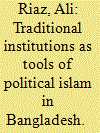

|
|
|
| 8 |
ID:
134223
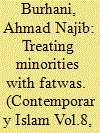

|
|
|
|
|
| Publication |
2014.
|
| Summary/Abstract |
The term "minority religious community" in the Muslim country of Indonesia refers not only to those embracing religions other than Islam, but also to minority groups like the Ahmadiyya. Recently, the treatment of Ahmadis has been worse than the treatment of non-Muslims. This article, therefore, intends to study the status of 'deviant' groups under Islamic law and the treatment of them in Muslim society. Specifically, this article addresses the following questions: How did ulama in the past define and treat minority groups? How do contemporary Sunni ulama define and treat the Ahmadiyya? What is the status of this group under Islamic law? Are they apostates, heretics, or unbelievers? And what are the legal consequences of these charges? To answer these questions, this article employs two methods. First, for theoretical treatment of minority groups in the past, this article focuses its analysis on al-Ghaz?li's Fay?al al-tafriqa and Fa??'i? al-b??iniyya. Second, following a discussion of classical Islam, the article moves to contemporary time by analyzing fatwas against the Ahmadiyya from five institutions: the R?bi?a al-'?lam al-Isl?m?, Majelis Ulama Indonesia (MUI), Muhammadiyah, Council of the Islamic Fiqh Academy of the Organization of Islamic Cooperation (OIC), and Nahdlatul Ulama (NU). This article argues that, first, fatwas against the Ahmadiyya issued by these institutions were intended as a device to sustain orthodoxy of umma and, second, orthopraxy or devoutness in observing religious rituals, as practiced by the Ahmadis, does not exempt them from the charge of apostasy because theologically they are believed to deviate from orthodox beliefs.
|
|
|
|
|
|
|
|
|
|
|
|
|
|
|
|
|
|
|
|
|